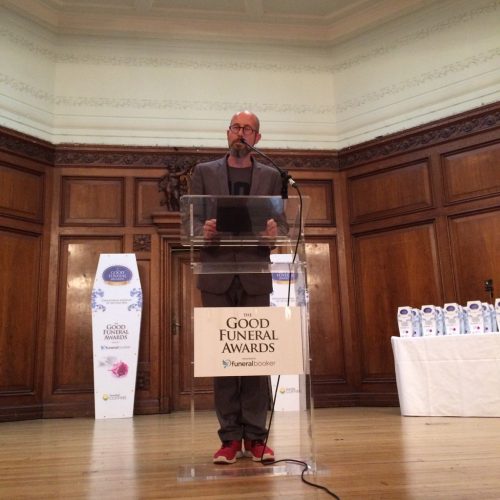We noted The Sun newspaper’s report on a floral tribute this week, pointing a mild gosh-look-at-this finger at a family’s ambition to let funeral wishes be carried out – to the perfumed, petalled letter.
However, it was the throwaway inclusion of another story, further down the page, that caught our eye. Moving on past the report of a Royal Artillery sergeant’s coffin being transported on a gun carriage – de rigueur perhaps – The Sun has a picture of a JCB at the head of a funeral cortège with a coffin secured carefully in its bucket.
A little background research revealed that Tony Law had always worked with plant machinery. As a digger enthusiast, he’d not only specified the mode of transport to his own service but also had his wishes extended by the family: instead of traditional, low-key or formal dress, everyone wore hi-viz jackets to mark the occasion. ‘Tony Law’s Last Ride’, they said.
Happily, in most situations these are far from being seen as irreverent gestures. They are endearing; a little eccentric, perhaps; but intended without malice to bridge the gap between the absent character of the person who has died and people who are coming together to commemorate that person’s unique life.
Flowers, saying ‘BARSTARD’? Traditional limousines on the one hand, but a bright yellow JCB to carry your coffin? It may not be the done thing to suggest it up-front without knowing the family’s background, but if the situation is the right one then – for a good funeral – these gestures are not out of place.
However, specific wishes like these may cause significant dismay, pain even, if they are set out in a funeral plan but not shared in advance. Karen Anstee’s short film, Rachel, brought this into sharp perspective last year. Anstee’s 10-film explored the relationships between religion and family: Rachel had rejected her conservative Jewish upbringing for a more bohemian life and wanted her ceremony to reflect those life choices. Rachel’s family wanted to reclaim her body for burial in the traditional way, and the story unfolds to reflect both points of view.
In the 21st century, diverging preferences are becoming more common. Families are, sadly, more dysfunctional than they once were. Couples of all ages may come together from different cultural backgrounds and pass on new traditions or beliefs to their children. Whereas, once, intimate rites of passage served to bring families and communities together at a difficult time, today the expression of individuality has the potential to stimulate conflict.
Nowadays the expected form for a funeral may bear little or no resemblance to the unique, individual service or ceremony that’s requested either by a partner, a close family member, or – prior to their death – by the persons who have died. And as a result, funeral directors and celebrants may find themselves in a difficult situation.
Questions, then.
We hear much, still, about the importance of making a Will and ensuring it’s valid and kept up-to-date. What more could we do to reappropriate the term ‘funeral plan’, or is it too toxic to contemplate?
Would it not help us all if we could encourage the solicitors or Will-makers we know, locally, to include detailed funeral arrangements as a part of that process, and to highlight the benefit of communicating these details in advance? Or would that be too complicated in itself?
And should we consider ‘how to tell people what’s happening’ guides as an integral part of the information we all provide – or do you do this already?

